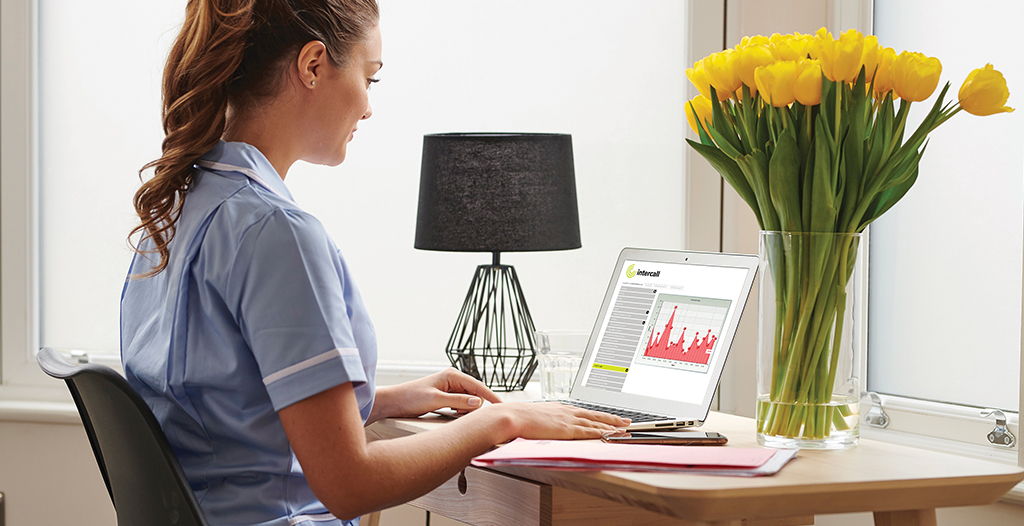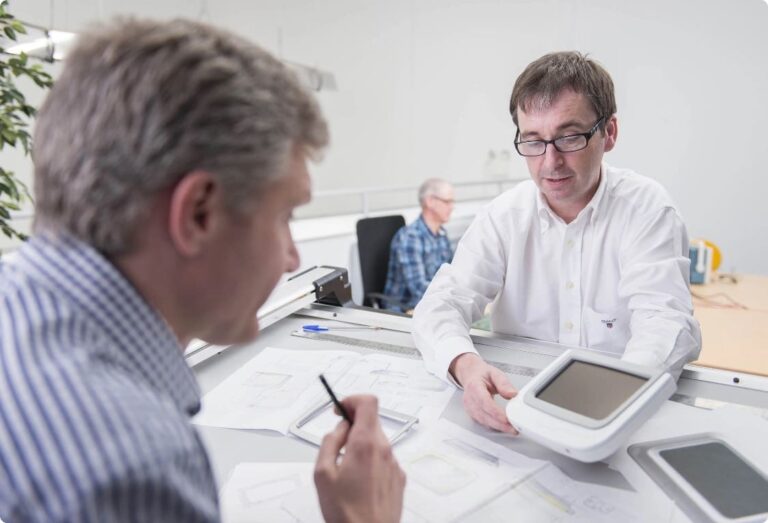Adam Daniels of Intercall believes that technical innovation can be a force for good in the UK Residential Sector. Here he tells us how considered innovation can help create a brighter future in challenging times.
It is no secret that the UK social care and residential living sector is facing unprecedented challenges. Industry publications and National newspapers are awash with reports of the rapidly aging UK population, care home closures, staffing issues, and rising costs with the current cost-of-living crisis. Care Managers and Owners are facing demands like never before.
The Office of National Statistics has reported that by 2045, the number of people aged 85 years and over will have doubled to over 3.1 million, representing 4.3% of the population. While by 2024, 24% of people living in the UK will be over 65. Partnered with fewer younger people entering the workforce, the strain on social care budgets looks unlikely to ease any time soon.
Recently, there have been reports of at least one Scotland-based care home closing every week* and the Care Inspectorate Wales (CIW) have reported that there were 87 fewer care homes in March 2023 compared to 2015, as well as 520 fewer care home places in March 2022 compared to 2015**.
The current cost-of-living crisis has seen the cost of food and incontinence products increase by 20%, along with the steep rise in the cost of utilities and insurance. Add to this demanding staffing issues, exacerbated by Brexit, the COVID pandemic and rising wage costs, all of which have impacted recruitment and retention across the sector at a time when the levels of care required in care facilities has increased, and it is not difficult to see why many in the sector feel at breaking point.
Approximately 40% of all care home residents are dementia patients. Caring for dementia patients can be stressful, exhausting and more time consuming for care staff due to the unpredictable nature of the disease. As the dementia takes grip and health deteriorates, the resident is likely to need more time and practical help with everyday tasks, including, bathing, grooming, and dressing. Many care home owners are warning they could be forced to close due to insufficient funding for people with dementia. Six care homes have recently closed in Plymouth, and a recent BBC report found the city’s council paid the least for a residential placement with dementia care and a nursing placement with dementia care. ***
The government has said it is spending up to £700m on adult social care reform over the next two years. But many providers are saying that government funding is not sufficient and amongst care providers there is a fear that council funding for dementia placements does not match the costs that care homes are facing, while care homes in council areas that are poorly funded, are getting an even worse deal.
Dementia Care Around the World
A world-wide issue, the aging population and challenge of dementia care is encouraging innovative person-centred solutions in other countries.
In Denmark, the Dagmarsminde Care Home is working to create a literal ‘home’ for its dementia residents, with bedrooms used only at night for sleeping, pets and petting animals (such as chickens and goats) and an established daily program that is repeated every day. In addition, the home focusses on both learning and the restorative abilities of activities such as walking, while limiting the use of night-time sleep-inducing medication. There is a strong focus on reducing or removing medications, with a medication rate of 1.4 pills per person each day, compared to an average of 10-12 pills for most people in Denmark with advanced dementia. The model of care is proving successful for staff and managers as well as residents, with minimal staff turnover and sickness levels of 1%, compared to an average 7%.
Meanwhile in Japan, the ‘Café of Mistaken Orders’ are cafés in Tokyo that hire people with dementia to work once a month. Approximately 30 percent of the Japanese population of about 125.7 million is over 65. More than 6 million Japanese people are estimated to have dementia, with the number expected to grow as high as 7.3 million — or 1 in 5 people over the age of 65 — by 2025, according to the Health Ministry.
Dementia cafes were introduced in Japan in 2017 and are popping up across the country. The aim is to help dementia patients prolong their active lives, allowing them to interact with new people, be productive and feel needed. In June 2023, Japanese Prime Minister Fumio Kishida, passed legislation to enact a slew of new programs and services to help those with dementia, identifying it as an urgent national project.

A Move towards Technical Innovation
Here in the UK, the Health and Social Care Secretary has introduced The Digital Social Care Records programme, a target that by March 2024, 80% of all CQC registered care providers should have adopted a digital social care platform. It is hoped that these records will play an essential role in joining up health and social care services.
Care homes and hospitals have been embracing technology and digital tools, understanding the benefits to the working environment, the level of care given and the benefits to the bottom line, for quite some time. Back in the late 1980s Nurse call systems using microprocessor technology began to replace the old bell and buzzer solutions. Intercall were at the forefront of these innovations, and these days are still developing innovative solutions to support the care sector, continuously researching, and developing products to help improve performance and make a positive change in the day to day running of care facilities and the lives of the residents that live within them.
Care Home Owners and Managers have been quick to see the benefits of integrating nurse call solutions with their existing systems. Secure data logging systems can automatically recall calls, alerts, and responses in real time, making light work of laborious manual time-consuming record keeping. What is more, the digitised records are much more accurate, up-to-date and readily available than manual records. Data is stored securely in a cloud service, enabling care managers to evaluate the number of calls, types of calls and response times, helping them make informed management decisions. Data can be accessed remotely, perfect for multi-site management or flexible working and reports are created at the touch of a button.
Harnessing digital care technology can help face-to-face care workers, taking away the need for hours of admin and form filling, freeing them up to spend more time with residents, giving more time to help alleviate the frustration and loneliness that is sometimes felt by many care home residents, especially those with dementia.
Data logging can also empower Care workers to focus on the individual needs of the resident, for example monitoring the levels of liquid ingested or the number of toilet visits, anticipating any complications such as dehydration or UTIs. It enables carers to be proactive rather than reactive to a resident’s needs, in turn helping keep them away from costly hospital stays. Data can be an invaluable tool in creating person-centred care plans, adapting the care given to the individual to meet their specific needs and preferences.
For specialised Dementia Care, thermal sensors are increasingly being installed in bedrooms passively monitoring the movement of residents prone to wandering, especially at night. The thermal sensor technology helps minimise trips and falls, that could be a hazard with older cabled systems. While the real time active monitoring allows staff and managers to establish the behaviour patterns of residents, logging and evidencing the ‘normal’ for each individual. Such patterns can be analysed to help with staffing levels, especially at night, while also flagging up behaviours that may be out of habit for that particular resident. The sensor can be set to trigger an alarm should the resident behave outside of their usual pattern, e.g., they usually visit the loo at 3am and are back in bed by 3:10am, but for some reason they do not return to bed within a set period, then an alarm would be triggered for staff to investigate.
Managers are also seeing the benefits of using care cards or tokens. Discreet and hygienic, staff are issued with a personalised card or token, which they use to gain access into authorised and restricted areas, including drug safes. The cards monitor staff response times, log movement around the facility and time spent in individual resident rooms, offering an extra level of security, accountability and reassurance for families and managers.
Integration and Simplicity are key.
Integration and simplicity are key to choosing nurse call systems and software solutions. Whether a single or multi-site facility, well-chosen systems can offer seamless integration, improved communication, increased productivity and efficiency. Care teams are often too busy delivering care to spend time being trained to use complicated software, while vocationally they are less likely to respond as well to desk-top computer work that can be perceived to take them away from hands-on immediate care giving. In designing and creating any innovation, it is crucial to consider the system user, whether care staff or residents, as well as the management team and the desired output. In short, it doesn’t matter how great your technical solution is if your staff struggle to engage with it and your residents are baffled by it. Care giving is complex, with increasing demands on staff time from managers and governing bodies, so keeping systems user friendly and immediate will help encourage staff to buy into the benefits of use.

A brighter future?
The sector is undoubtably facing unprecedented challenges, care managers agree that while being no magic wand, well-chosen technology can help alleviate some of the pressure points experienced in the current climate. While technology can never be a substitute for in-person care, harnessing technical innovations, products and sector-specific software can help ease the strain on care staff and managers through support, accountability and in turn have a positive impact on stretched budgets, which really can’t be a bad thing.
About Intercall
Intercall design and manufacture innovative nurse call and staff safety systems in the UK. Their nurse call Intercall Touch, One and 600/700 systems can be found installed in care homes, hospitals and face facilities across the UK and Europe. Intercall exports to over 60 countries worldwide, including the Middle East, India, and Africa.
Adam Daniels is responsible for Export Development & Marketing at Intercall.


